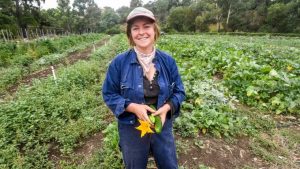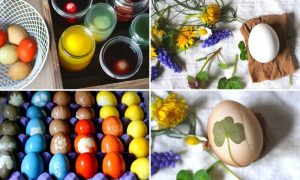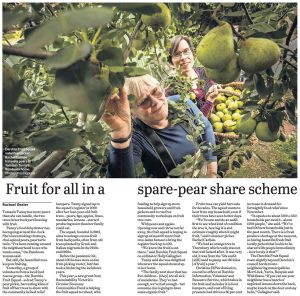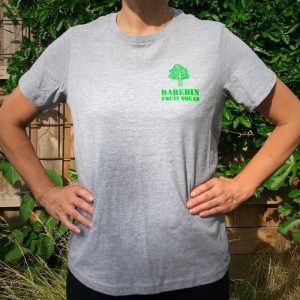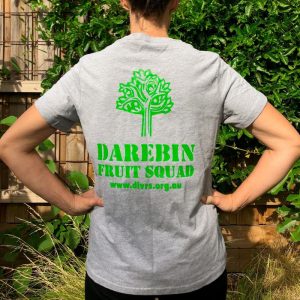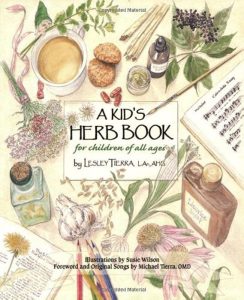Thanks to the people who have contributed to this week’s newsletter: Colleen Duggan, Lisa Conley and Robin Gale-Baker.
Soaking seeds before planting (by Robin Gale-Baker)
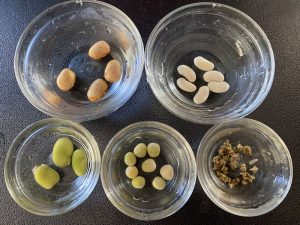 Seed soaking is a technique used by gardeners for some, but not all, seeds. The seeds that are suitable for soaking before planting are those that need lots of moisture and light to germinate and/or have a tough or wrinkly outer covering. Tiny seeds are not suitable. For veggies, the main seeds that can usefully be pre-soaked are:
Seed soaking is a technique used by gardeners for some, but not all, seeds. The seeds that are suitable for soaking before planting are those that need lots of moisture and light to germinate and/or have a tough or wrinkly outer covering. Tiny seeds are not suitable. For veggies, the main seeds that can usefully be pre-soaked are:
- Peas, beans and broad beans.
- Cucumbers, pumpkins and sweetcorn.
- Silverbeet (aka chard) and beetroot.
There is not much dispute about the lists about though some people are not in favour of soaking beans, saying that they sometimes split within hours.
Seeds comprise an embryo inside an outer, protective covering. In simple terms, germination occurs when the embryo ‘shoot’ breaks through the outer covering. To do this, the seed needs a source of constant moisture, and light or darkness depending on what it is (e.g. lettuce germinates in light but tomato seed needs to be covered with soil which provides darkness). The thicker the seed casing the slower the seed germinates (the thick casing of some seeds is protective because the seed may be subjected to stresses such as cold, bruising, being trodden on, etc and needs to survive these till spring).
Pre-soaking seeds has a number of potential advantages: it triggers germination, speeds it up, provides a quick start where a short growing season for a vegetable is critical, and breaks down any inhibitors on the seed more quickly than in nature. There is no evidence that it increases germination in quality seed – either the seed is viable or it is not.
When soaking seeds, cover them with lukewarm water (not hot water). Depending on the thickness of the seed coat, soak anywhere between 8 and 24 hours. In preparation for this article, I soaked 5 lots of seed including bean, pea, broad bean, borlotti bean and beetroot. None of them split until day 5 so I think any seed soaked for up to 24 hours will be fine. I soak my seeds overnight, putting it in lukewarm water just before I go to bed and planting it when I get up the next morning.
Seeds as small as silverbeet and beetroot right up to large pumpkin seeds are easy to handle when wet. They can be placed in drills relatively easily and spaced well so that little thinning is required. On the other hand, seeds such as lettuce would be a nightmare to spread as they would clump together and separating them would be impossible.
Some people add vinegar to the soaking water in the belief that this will emulate the acidic condition of an animal’s stomach and break down the casing more quickly but this is unproven. Others suggest adding some Seasol or Maxicrop to the water; whilst this may give the seed some extra nutrients to see it on its way, I have not found this to be necessary.
The photo right is after around 48 hours in water.
Want to help create a cookbook?
The Food Collective, who are based in Greensborough, are seeking contributions of recipes, food saving tips and artwork from local community members, school and community groups. Their cookbook will contain sections for recipes and tips that are aimed towards helping those with smaller budgets plus resources to help make produce go further. If potentially interested, contact Kerri Wellington by phone (9435 8282) or email (kerri.wellington@dvsupport.org.au).
Do you know?
Claire Stronge writes in: “I struggle with sourcing wood suitable for large garden structures/wigwams to grow sweet peas and climbers. In the UK, I always made them with flexible hazel foraged in our local woods. I’d love to stop using bought bamboo canes but I’m not sure what locals use here. Any advice?” Email us with your responses.
Potato peels for dinner?
[Here is another a recent tip from CERES Fair Food that I thought was quite interesting.]
Soak the peels in cold water for 30 minutes. Drain, dry thoroughly with a tea towel then toss in olive oil and salt or whatever flavour combo takes your fancy. Bake in a 200degC oven for about 20 minutes, turning every 5 minutes. They’re the fanciest crispy chip going round!
Meg’s garden this month
In my garden, the long wands of small blue Easter daisy (Asters) flowers have finally opened. They signal Autumn and return after being cut back to the base each year. The apples and quinces are now also ready. We have harvested basketfuls of quince this year from a single tree. As quinces are hardy, this tree is unwatered in our garden, but the abundance reflects the benefits of the recent wet weather. The quince paste has been made and I have opted for the slow cooker method this year as I like a softer paste rather than a ‘quince cheese’.
The soil is now very dry and needs rejuvenation with lots of organic matter and the final clearance of summer crops allows us to top up the beds. I have finally harvested the pumpkins (as the stems turn brown) and they are sitting in a row on the front porch drying. The Queensland Blues are quite large this year and I am wondering if I will be able to cut them without a bandsaw when the skins harden.
This is the time to plant salad crops and leafy greens which love the cooler weather and will not bolt to seed. I am looking forward to fresh salad mix with my favourite dressing. Simply mix until the honey is incorporated. Note that you can also include a sprinkle of aster petals with your greens.
Dressing for a green salad
One small spring onion (white part only), very finely diced.
Half a clove of garlic, very finely chopped (not crushed).
¼ cup of sherry vinegar.
1 cup good olive oil.
2 teaspoons Dijon mustard.
1 teaspoon honey.
Salt to taste.
What seeds to plant in May
Here is a list (see the planting guide for more detail):
BrassicasKale |
Cool season veggiesBroad beans |
Leafy greensLettuce |
OtherCarrot |
If you haven’t planted your cool season veggie seeds yet, plant them now. It’s now a bit late for planting broccoli, cabbage and cauliflower seeds (but it’s ok to plant seedlings).
Read Helen’s guides on growing garlic.
Read Robin’s guides on growing broad beans and garlic.
Which link was clicked most times in the last newsletter?
The most popular link in the last newsletter was Whitehorse Council’s Sustainable Living Week.
 Joke (or pun) of the week
Joke (or pun) of the week
Three fonts (Comic Sans, Helvetica, and Times New Roman) walk into a bar.”Get out!” shouts the bartender. “We don’t serve your type here!”
Not food-related but interesting
Climate action and resilience course (6 sessions); on consecutive Tuesdays from 2nd May, 6.30-8.30pm; $60 ($5 per hour); Thornbury.
Worried about climate change, but not really sure where to start? Join them to find out how you can best use your skills, energy and passion for a better future. Learn about the causes and effects of climate change and how we can become more resilient to it as individuals, households and communities. The 6 sessions are entitled: C4C climate conversation; finding our niche; action; emotional climate resilience; practical climate resilience; and exploring what we want to do as a group together. Read more. At Span Community House, 64 Clyde Street,
Thornbury. Book your place.
Not face-to-face but interesting
Thrifty gardening; Wednesday, 21st June, 6-7.30pm; free; online.
Maria Ciavarella will present on being a successful gardener without spending a lot of money. The topics to be covered will include: how to use home made compost in different ways; seedlings from seed and basic seed saving tips; striking plants from cuttings; DIY organic fertilisers; and making self-watering pots
Regular activities over the coming week
Farmers’ and other food markets
- Friday: Community Grocer, Carlton.
- Saturday: Carlton and Coburg.
- Sunday: Alphington and Eltham.
- Tuesday: Community Grocer, Fitzroy.
- next Wednesday: Really Really Free Market (Coburg).
Food swaps
- Saturday: Brunswick East.
- Sunday: Collingwood Yards.
Community gardens
- Thursday: Diamond Valley Library (Greensborough), Edible Hub (Hurstbridge), SEEDs (Brunswick) and Whittlesea (including a workshop on fresh herbs and herbal teas).
- Friday: Reynard Street (Coburg) and West Brunswick.
- Saturday: Links (Lalor), Macleod and Thrive (Diamond Creek).
- Sunday: Bellfield, Fawkner Food Bowls, Pentridge (Coburg) and Regent (Reservoir) (including a workshop on seed propagation).
- Monday: SEEDs (Brunswick) and Whittlesea.
- Tuesday: Watsonia Library.
- Next Wednesday: Bellfield, Eltham Neighbourhood House, Macleod, Newton Street (Reservoir), Span (Thornbury) and Sylvester Hive (Preston) .
Upcoming face-to-face events – not cooking
Dementia and food; Saturday, 6th May, midday-1.30pm; free; Fitzroy North.
Dr Peter Johnston will discuss diet and dementia. Organised by Green Karma.
Urban wine walk; Saturday, 27th May, midday-4pm; $80; Collingwood.
This is a self-guided wine tasting experience, where you choose the order in which you visit the various venues. The ticket includes 30 complementary tastings, a $10 food voucher, a $25 voucher for wine orders and a tasting glass. The participating venues and winemakers: Bad Frankie with Philip Lobley Wine; Fee Fee’s Bar with Empire of Dirt Wine; Glou with Little Brunswick Wine Co; Goldy’s Tavern with MoBo Vino; Gum Bar with Vallee du Venom; Hotel Collingwood with Mt Langi Ghiran; Molly Rose Brewing with Pacha Mama; Paradise Alley with Konpira Maru; and The Craft & Co with Concrete & Clay.
Hot compost workshop; Sunday, 28th May, 2-3pm; free; Reservoir.
Learn all about hot composts – what they are, how they work, what goes in them and how to look after them while you make a hot compost. Organised by Friends of Regent Community Garden.
Cultivating Community workshop; Saturday, 10th June, midday-2pm; free; Carlton.
Learn about all matters related to growing food, food waste, composting and the circular economy.
Home brewing; Saturday, 17th June, 10am-2.30pm; $100 ($22 per hour); CERES.
What you will learn: make your own beer; all about full grain brewing; and the fermentation process. What you will get: samples of different beers; and recipes to take home. Presenter: Paul Rigby. The workshop will be a practical demonstration of full grain brewing covering ingredients (including malt, hops, yeast and water), equipment, brewing theory, and (most importantly) the brewing process (including mashing, lautering, boiling, sanitation, fermentation and packaging). Samples will be available for tasting.
Open Cellars Weekend; Saturday, 17th June and Sunday, 18th June, both 11am-5pm; free; Nillumbik.
Visit any or all of the family-owned wineries in Nillumbik. This is a chance to sample wines at wineries not always open to the public. You will also find food to complement the wine, as well as live music and artworks from local artists at some venues. There is no entry fee, or tasting fee, at any of the venues. The participating wineries include: Buttermans Track, Easthill Estate, Hildebrand Ridge Organic Vineyard, Kings of Kangaroo Ground, Nillumbik Estate, Panton Hill Vineyard & Winery, Punch Wines, Shaws Road Winery, Wedgetail Estate and Yarrambat Estate Vineyard.
In-depth mushroom cultivation workshop; Sunday, 18th June, 10am-4pm; $165 ($28 per hour); Alphington.
You will learn the growing methods for oyster mushrooms, including inoculation, sterilisation and be introduced to basic mycology. You will undertake practical sessions and learn how to start master cultures. You will also be given a tour of the mushroom farm. Take a clean 5-10L bucket with a lid and some gloves. Organised by The Mushroomery.
In April
- Fresh herbs and herbal teas; Thursday, 27th April, 10am-midday; free; Whittlesea.
- Autumn seasonal gardening with Kaye Roberts-Palmer; Thursday, 27th April, 11am-midday; free; Doncaster.
- Bee biosecurity at CERES; Friday, 28th April, 6.30-8pm; free; CERES.
- Grow food at home (9 sessions); on Fridays, 9.30am-1.30pm, starting 28th April and ending 23rd June; free subject to ACFE eligibility; Fawkner.
- Edible wreaths; Saturday, 29th April, 10-11.30am; free; Greensborough.
- Seed saving; Saturday, 29th April, 10-11.30am; free; South Morang.
- Introduction to permaculture (2 sessions); Saturdays, 29th April and 6th May, 10am-3pm; $120 ($12 per hour); Coburg.
- Home composting for beginners; Saturday, 29th April, 2-3.30pm; free; Edendale.
- Diet for good mental health; Sunday, 30th April, 11am-12.30pm; free; Fitzroy North.
- Compost and worm farm workshop; Sunday, 30th April, 11am-1pm; free; Brunswick.
- Seed propagation workshop; Sunday, 30th April, 2-3.30pm; free; Reservoir.
- An afternoon with Matthew Evans, the Gourmet Farmer; Sunday, 30th April, 2-5pm; free; Box Hill.
In May
- Introduction to composting, worm farms and Bokashi bins; Monday, 1st May, 1-2.30pm; free; Ringwood.
- Wine appreciation (8 sessions); 8 sessions on consecutive Tuesdays, starting 2nd May, 7.30-9.30pm; $100 ($6 per hour); Eltham.
- Caring for your gut; Wednesday, 3rd May, 6.30-8pm; $45 ($30 per hour); Fitzroy North.
- Seed saving with Maria Ciavarella; Wednesday, 3rd May, 6.30-8.30pm; free; Doncaster.
- Turning food waste into energy; Saturday, 6th May, 10am-midday; free; Coburg.
- Dementia and food; Saturday, 6th May, midday-1.30pm; free; Fitzroy North.
- Composting and worm farming workshop; Saturday, 6th May, 2-4pm; free; Camberwell.
- Youth world food garden – why waste it?; Saturday, 6th May, 2-5pm; free; Preston.
- Grow your own food (4 sessions); 4 sessions on consecutive Sundays, starting 7th May, 9.30am-2pm; $112 ($6 per hour); Preston.
- Kalorama Chestnut Festival; Sunday, 7th May, 10am-4pm; free; Kalorama.
- Heritage apple tasting; Sunday, 7th May, 2-4pm; $15; Templestowe.
- Composting, worm farming and bokashi bins workshop; Monday, 8th May, 10-11.30am; free; Bayswater North.
- Beeswax wrap workshop; Monday, 8th May, 6-8pm; $55 ($28 per hour); Brunswick.
- Beginners composting workshop; Tuesday, 9th May, 7-8.30pm; free; Doncaster.
- Become a master composter; Wednesday, 10th May, 10am-midday; free; Whittlesea.
- Advanced composting workshop; Wednesday, 10th May, 7-8.30pm; free; Doncaster.
- Seila Hierk on Asian winter vegetables; Wednesday, 10th May, 8-10pm; free; Doncaster East.
- Rum, cheese and beer masterclass; Thursday, 11th May, 7-9pm; $79 ($40 per hour); Preston.
- Complete urban farmer (14 sessions); weekly sessions starting Friday, 12th May, 9am-3pm; $895 ($11 per hour); CERES.
- Heathcote in the city; Saturday, 13th May, midday-6pm; $230 ($38 per hour); Abbotsford.
- Setting up a worm farm; Saturday, 13th May, 2-3.30pm; free; Edendale.
- Organic guide to urban farming course (5 sessions); on Sundays between 14th May and 18th June, each 10am-2pm.; $123 ($5 per hour); Richmond.
- Spoon carving workshop with an axe and knife; Saturday, 20th May, 10am-4pm; $230 ($38 per hour); Coburg North.
- Growing funghi at home; Saturday, 20th May, 11am-12.30pm; $20 ($14 per hour); Hurstbridge.
- Olives to oil; Sunday, 21st May, midday-3pm; $15; Preston.
- Olives to oil harvest festival; Sunday, 21st May, midday-4pm; $15; Brunswick East.
- Smart storage to reduce food waste workshop; Tuesday, 23rd May, 10-11.30am; free; Ringwood.
- Mood and food workshop; Tuesday, 23rd May, 11am-1pm; free; Eltham.
- Mushroom foraging; Thursday, 25th May, 6.30-8.30pm; $85 ($43 per hour); Collingwood.
- Edible weeds walk; Saturday, 27th May, 10.30am-12.30pm; $30 ($15 per hour); Brunswick East.
- Urban wine walk; Saturday, 27th May, midday-4pm; $80; Collingwood.
- Edible weeds walk; Saturday, 27th May, 1.30-3.30pm; $30 ($15 per hour); Brunswick East.
- The fungus amongst us; Sunday, 28th May, 10am-12.30pm; $60 ($24 per hour); Alphington.
- Hot compost workshop; Sunday, 28th May, 2-3pm; free; Reservoir.
In June
- Egg carrier bags; Saturday, 3rd June, 10am-3pm; free; Kinglake.
- DIY mushrooms; Saturday, 3rd June, 10am-4pm; $175 ($29 per hour); CERES.
- Complete urban farmer (14 sessions); weekly sessions starting Wednesday, 7th June, 9am-3pm; $895 ($11 per hour); CERES.
- Composting and worm farming with Ella Boyen; Wednesday, 7th June, 6.30-8.30pm; free; Doncaster.
- Organic vegetable gardening for beginners; Thursday, 8th June, 11am-midday; free; Greensborough.
- Edible weeds; Saturday, 10th June, 10am-midday; $60 ($30 per hour); CERES.
- Cultivating Community workshop; Saturday, 10th June, midday-2pm; free; Carlton.
Regular events
- Beekeeping workshop; roughly once a month on Saturdays, 1-3.30pm; $85 ($34 per hour); Brunswick East.
- Carlton aperitvio food tour; every Friday, 5-7pm; $139 ($70 per hour); Carlton.
- Eltham trials (walking food tour); various Saturday mornings and Thursday evenings; $65 ($22 per hour); Eltham.
- Flavours of Coburg food tour; 3rd Saturday of each month, 10am-1pm; $65 ($22 per hour); Coburg.
- Gin making masterclass; most Saturdays, 10am-1pm; $175 ($58 per hour); Nunawading.
- Ratio Cocoa Roasters behind the scenes chocolate factory tour; various Fridays and Saturdays; $20 ($14 per hour); Brunswick.
- Spoon carving workshop; various Saturdays and Sundays, 10am-1pm; $130 ($43 per hour); Coburg North.
- Truffle workshop at Ratio Cocoa Roasters; 3rd Sunday of each month, 11am-1pm; $75 ($38 per hour); Brunswick.
- Wine tasting masterclass; Saturdays, 3-5pm; various prices; Northcote.
Upcoming face-to-face events – cooking
Turkish cooking, an introduction; Monday, 8th May, 6.30-8.30pm; $65 ($33 per hour); Balwyn North.
Join Arzu Yilmaz to learn how to make four different vegetarian dishes: a lentil soup, a meze, Turkish borek and a dessert. Arzu will also talk about her experiences as an Istanbul girl and her Turkish identity. Organised by Trentwood at the Hub.
Induction cooking demonstration; Wednesday, 10th May, 12.30-2pm; free; Ivanhoe.
Join Open Table for a cooking demonstration of how to reduce food waste and cook meals on induction. They will be making leftover fritters and doing some pickling, so take a jar if you’d like to take some home.
Kombucha introduction; Thursday, 11th May, 10am-midday; free; Eltham.
Deano, from Good Brew, will tell you everything you need to know about how to brew kombucha and its benefits. There will be an opportunity to taste test the good brew range and also purchase starter kits. Organised by Living & Learning Nillumbik.
Induction cooking demo at Preston Market; Saturday, 13th May, 11am-1pm; free; Preston.
Open Table will discuss the benefits of induction cooking. Drop in at any time, with the discussions running for 15 minutes every half an hour.
Food literacy (6 sessions); 6 consecutive Thursdays, starting 18th May, 10am-1.30pm; $65 ($3 per hour); Preston.
You will explore nutritional theory, healthy eating concepts and gain hands-on culinary skills. You will learn about the nutrients specific to each food group and their benefits, including how energy is balanced to maintain a healthy weight. The course will also cover how to decipher labelling on food packaging to build a healthy meal plan on a budget. The sessions will be led by a certified nutritionist. Organised by Bridge Darebin.
Sourdough bread making; Saturday, 20th May, 10am-1pm; $55 ($18 per hour); Panton Hill.
Learn how to make sourdough bread. You will make a pizza base to enjoy together and you will take home a bread dough ready to bake the following day at home, plus some starter so you can continue to make bread at home. Take an apron, tea towel, sealable container and jar with a screw top lid. Tutor: John. Organised by Living & Learning Nillumbik.
Induction cooking workshop; Saturday, 27th May, 11am-12.30pm; free; Fitzroy North.
Open Table will discuss the benefits of induction cooking, while presenting some recipes. They will be making stale bread gnocchi and whipping up some quick pickle so take a jar so you can take some home.
Gozleme and baklava workshop; Monday, 12th June, 6.30-8.30pm; $65 ($33 per hour); Balwyn North.
Arzu will teach you how to make gozleme and baklava from scratch. Turkish coffee will be served. Includes ingredients. BYO some containers (you will be going home with what you cook, usually about 1.2 kg of baklava and 3-4 gozlemes), apron and oven tray. Organised by Trentwood at the Hub.
How to make fresh gnocchi; Thursday, 15th June, 6.30-8.30pm; $36 ($18 per hour); Lower Templestowe.
Make gnocchi from scratch the Italian way using basic pantry ingredients coupled with two sauces. Enjoy tasting the dishes with the other participants. You will take home your freshly made gnocchi. Take a container and an apron. Organised by Living And Learning @ Ajani.
Italian cooking (2 sessions); Thursdays, 15th and 22nd June, both 6-9pm; $195 ($33 per hour); Surrey Hills.
Lucia Silverii will teach you the time-honoured techniques of southern Italian cooking. The first session will cover pasta with zucchini and tuna and lemon biscuits. The second session will cover chicken scallopine and almond biscotti. Organised by Surrey Hills Neighbourhood Centre.
Make and eat savoury Japanese pancakes; Friday, 16th June, 11am-1pm; $15; Greensborough.
Chika will show you how to make savoury Japanese pancakes. You will also get to enjoy them for lunch. Organised by Greenhills Neighbourhood House.
Truffle and praline workshop; Friday, 16th June, 6-10pm; $180 ($45 per hour); Blackburn.
Learn how to create handmade chocolates from start to finish using your creative influences to make unique flavours and shapes. They will cover flavour combinations, ganache based flavours, nut pralines, enrobing methods and finishes. You will take home all you make in the workshop along with the recipes and an instruction booklet.
Mozzarella, burrata and stracciatella cheese making; Sunday, 18th June, 10am-3pm; $240 ($48 per hour); CERES.
You will learn how to make mozzarella, burrata and stracciatella cheeses. You will take home what you make. Presenter: Kristen Allan.
In April
- Kraut M.O.B.; Wednesday, 26th April, 6.30-8pm; $85 ($57 per hour); Fitzroy North.
- The cook program (9 sessions); on Thursdays, 9.30am-1.30pm, starting 27th April; $50 ($1 per hour) subject to ACFE eligibility; Brunswick.
- Low and slow masterclass (BBQ); Friday, 28th April, 5.30-9.30pm; $99 ($25 per hour); South Morang.
- Pasta making workshop; Saturday, 29th April, 10am-1.30pm; $63 ($18 per hour); Abbotsford.
- Pasta making workshop; Saturday, 29th April, 1-3pm; $55 ($28 per hour); Park Orchards.
- Food waste workshop with Open Table; Saturday, 29th April, 2-4pm; free; Carlton.
In May
- Cooking from the pantry (8 sessions); Tuesdays, starting 2nd May, 9.30am-midday; $50 ($3 per hour); Lower Templestowe.
- Preserving the harvest – then and now; Tuesday, 2nd May, 2-3pm; free; Mooroolbark.
- Catering 4 success (8 sessions); Tuesdays, 2nd May to 20th June, each 10am-2pm; $48 ($2 per hour); Bayswater North.
- Cooking for one (5 sessions); Thursdays, starting 4th May, 11am-1pm; $50 ($5 per hour); Lilydale.
- Sourdough basics; Thursday, 4th May, 6.30-8.30pm; $120 ($60 per hour); Collingwood.
- Sourdough breadmaking; Saturday, 6th May, 10am-12.30pm; $64 ($26 per hour); Lower Templestowe.
- Vegetable fermentation workshop; Saturday, 6th May, 10am-1pm; $60 ($20 per hour); Bayswater North.
- Gnocchi making class; Sunday, 6th May, 10am-1pm; $140 ($47 per hour); Thomastown.
- Growing and cooking with bushfoods; Saturday, 6th May, 10am-3pm; $120 ($24 per hour); CERES.
- Indian ferments with Helly Raichura; Saturday, 6th May, 3-5pm; $125 ($63 per hour); Fitzroy North.
- Turkish cooking, an introduction; Monday, 8th May, 6.30-8.30pm; $65 ($33 per hour); Balwyn North.
- Learn how to make pickles; Monday, 8th May, 7-9pm; free; Greensborough.
- Water kefir M.O.B.; Tuesday, 9th May, 6.30-8pm; $85 ($57 per hour); Fitzroy North.
- Induction cooking demonstration; Wednesday, 10th May, 12.30-2pm; free; Ivanhoe.
- Honey ferments M.O.B.; Wednesday, 10th May, 6.30-8pm; $110 ($73 per hour); Fitzroy North.
- Kombucha introduction; Thursday, 11th May, 10am-midday; free; Eltham.
- Preserving and fermenting workshop with Insun Chan; Thursday, 11th May, 2-3.30pm; free; Lilydale.
- Indian cooking workshop series (3 sessions); starting Thursday, 11th May, 2-4pm; $210 ($35 per hour); Alphington.
- Inner peas – cooking program (4 sessions); On consecutive Thursdays, starting 11th May, each 4-6pm; free; Hawthorn.
- Blokes in the kitchen (2 sessions); Fridays, 12th May and 9th June, both 9am-midday; $90 ($15 per hour); Surrey Hills.
- Traditional arancini and cantucci biscuits workshop; Saturday, 13th May, 10am-1pm; $180 ($60 per hour); Mount Evelyn.
- Induction cooking demo at Preston Market; Saturday, 13th May, 11am-1pm; free; Preston.
- French patisserie – Mother’s Day cake; Saturday, 13th May, 1.30-4.30pm; $125 ($32 per hour); Lower Templestowe.
- Sourdough for beginners; Saturday, 13th May, 2-5pm; $60 ($20 per hour); Brunswick.
- French patisserie – macarons; Wednesday, 17th May, 6.30-8.30pm; $85 ($43 per hour); Lower Templestowe.
- Food literacy (6 sessions); 6 consecutive Thursdays, starting 18th May, 10am-1.30pm; $65 ($3 per hour); Preston.
- How to make fresh ravioli; Thursday, 18th May, 6-8.30pm; $49 ($20 per hour); Lower Templestowe.
- Miso M.O.B.; Thursday, 18th May, 6.30-8.30pm; $145 ($73 per hour); Fitzroy North.
- Chocolate making workshop; Friday, 19th May, 6.30-8.30pm; $80 ($40 per hour); Park Orchards.
- Sourdough bread baking; Saturday, 20th May, 9am-5pm; $190 ($24 per hour); CERES.
- Sourdough bread making; Saturday, 20th May, 10am-1pm; $55 ($18 per hour); Panton Hill.
- Fermenting workshop; Saturday, 20th May, 10am-1pm; $100 ($33 per hour); Kinglake.
- Middle Eastern cooking; Saturday, 20th May, 10am-1pm; $80 ($27 per hour); Park Orchards.
- FFS … ferment four staples; Saturday, 20th May, 1-5.30pm; $365 ($81 per hour); Fitzroy North.
- Italian sweets workshop; Sunday, 21st May, 10am-1pm; $180 ($60 per hour); Mount Evelyn.
- Preserving the season’s harvest; Sunday, 21st May, 10am-3pm; $120 ($24 per hour); CERES.
- Dumpling making workshop; Friday, 26th May, 6-8.30pm; $75 ($30 per hour); Park Orchards.
- Sourdough breadmaking (2 sessions); Saturdays, 27th May and 17th June, both 10am-12.30pm; $150 ($30 per hour); Park Orchards.
- Filled pasta with Piera; Saturday, 27th May, 10am-1pm; 140 ($47 per hour); Thomastown.
- Feta, haloumi and mascarpone cheese making; Saturday, 27th May, 10am-4pm; $240 ($40 per hour); CERES.
- Induction cooking workshop; Saturday, 27th May, 11am-12.30pm; free; Fitzroy North.
- French patisserie – macarons (advanced); Saturday, 27th May, 1.30-4.30pm; $115 ($38 per hour); Lower Templestowe.
- Gluten-free kitchen skills; Sunday, 28th May, 10am-3pm; $120 ($24 per hour); CERES.
- Farmhouse sake / doburoku night; Wednesday, 31st May, 6.30-8.30pm; $125 ($63 per hour); Fitzroy North.
In June
- Truffle and praline workshop; Friday, 2nd June, 6-10pm; $180 ($45 per hour); Blackburn.
- Sourdough breadmaking (advanced); Saturday, 3rd June, 10am-12.30pm; $70 ($28 per hour); Lower Templestowe.
- Vegan cooking Italian style; Saturday, 3rd June, 10am-3pm; $120 ($24 per hour); CERES.
- Indian cooking – South Indian (2 sessions); Wednesdays, 7th and 14th June, both 6.30-8.30pm; $118 ($30 per hour); Hurstbridge.
- Gozleme and baklava workshop; Monday, 12th June, 6.30-8.30pm; $65 ($33 per hour); Balwyn North.
- Get your dad in the kitchen!; Wednesday, 14th June, 4-6pm; free; Hawthorn.
Regular classes
- Artisan bread making; various Sundays, 8am-2pm; $230 ($38 per hour); Abbotsford.
- BBQ classes; various days and times; $135-150 ($45-50 per hour); Brunswick East.
- Beginners bread making; various Sundays, 8am-2pm; $230 ($38 per hour); Abbotsford.
- Brunswick Kitchen (many different classes); various dates, times and prices but mostly 2½ hours long and $120; Brunswick.
- Chocolate making and pastry classes for children; various days and times; various costs; Yarra Glen.
- Chocolate making workshop; various Thursdays, Fridays and Saturdays; $152 ($38 per hour); Blackburn.
- Chocolate making workshop; various Saturdays and Sundays; $125 ($63 per hour); Box Hill North.
- Juanita’s Kitchen (plant-based); various dates, times and prices; Preston.
- Kombucha brewing workshop; last Thursday of each month, 7-11pm; $49 ($12 per hour); Brunswick.
- La Cucina di Sandra (Italian); various evenings, 6.30-10.30pm; $120 ($30 per hour); Richmond.
- Margot & Montanez (alfajores biscuits); monthly on Sundays, 10am-1pm ; $109 ($36 per hour); Camberwell.
- Nonna & Mum’s cooking class; 4th Thursday of each month, 7-10pm; $24 ($8 per hour); Thornbury.
- Otao Kitchen (many different classes); various dates, times and prices but mostly 3 hours long and $197; Abbotsford.
- Rosa’s cooking classes (Italian); various Saturdays and Sundays, 10.15am-3pm; mostly $165 ($35 per hour); Bundoora.
- Sourdough bread workshop; roughly once a month on Saturdays, 9-11.30am; $185 ($74 per hour); Brunswick East.
- Tea blending; various Sundays; $75 ($60 per hour); Brunswick.
- The ultimate biscuit class; various Tuesdays, 10am-3pm; $162 ($32 per hour); Blackburn.




